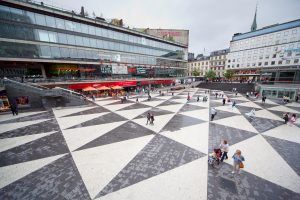Addressing a Gap – How to Better Support Civil Society
Cerrando la brecha: Cómo apoyar a la sociedad civil
Robust and vibrant civil societies play a critical role in contributing to development. Civil society helps shape policies, advocate for the needs and demands of citizens, provide essential services, protect human rightsAn essential part of open government includes protecting the sacred freedoms and rights of all citizens, including the most vulnerable groups, and holding those who violate human rights accountable. T..., and strengthen public participationGiving citizens opportunities to provide input into government decision-making leads to more effective governance, improved public service delivery, and more equitable outcomes. Technical specificatio... in democracy.
Yet, over the past decade, there has been insufficient attention to ensure that a strong and vibrant civil society flourishes and by contrast many governments have, explicitly or inadvertently, made attempts to restrict and harm civic space.
This hesitancy to strengthen and embrace civil society is reflected in OGP action plans. Only 122 of a total of 4,900 commitments since 2011 have focused on civic space, and only eight out of 77 national OGP members are currently implementing a commitmentOGP commitments are promises for reform co-created by governments and civil society and submitted as part of an action plan. Commitments typically include a description of the problem, concrete action... on this theme.
To explore this gap and spotlight civic space, OGP brought together the Democratic Freedoms Learning Network, which aims to unpack civic space challenges, understand progress and learn from experiences across different regions.
The first meeting took place on 12 September 2022 and focused broadly on the enabling environment for civil society – namely the legal environment, administrative measures, and funding modalities. Here are five broad takeaways from the discussion, which will guide the work of the Democratic Freedoms and Learning Network over the coming months:
- Build trust and dialogue between government and civil society to create a basis for an enabling environment for civil society. Examples include formal platforms designed as a space for exchange and input to more informal spaces facilitated by NGOs.
- Create a clearly articulated strategy to promote and protect civil society. A strategy can help garner political buy-in and facilitate the integration of civil society into all relevant policy areas. Currently nearly 70% of OECD countries have a strategy on civil society as outlined in the OECD’s forthcoming inaugural report on civic space.
- Ensure equity between business and civil society recognising the needs of CSOs. The European Union’s current initiative to adopt minimum standards for the governance of NGOs builds on long-standing rules for businesses and in North Macedonia, a new Central Register for NGOs is being tailored to the needs of civil society.
- Adopt a long-term approach to focus on both the design and implementation of the strategies, rules, and policies. Tools such as the National Enabling Environment Assessment carried out in the Philippines and the OECD’s civic space scans can help alongside plans that promote implementation at an early stage.
- Develop a holistic view of civil society to promote a trusted and vibrant space. Understanding the diverse and complementary roles of civil society and their varied contributions to public and economic life is key. For example, in most countries, civil society comprises around 5-10% of the total workforce.
Over the coming months, the Democratic Freedoms Learning Network will draw on these building blocks to explore different subthemes and work with countries to exchange experiences and support new initiatives that promote civic space.
Una sociedad civil robusta y dinámica desempeña un papel fundamental en el desarrollo. La sociedad civil es importante porque ayuda a definir políticas, aboga por las necesidades y exigencias de la ciudadanía, ofrece servicios fundamentales, protege los derechos humanos y fortalece la participación pública en la democracia.
Sin embargo, en los últimos diez años no se ha prestado suficiente atención a asegurar que la sociedad civil se desarrolle. Por el contrario, muchos gobiernos han restringido y dañado el espacio cívico, ya sea explícita o involuntariamente.
Esta falta de contundencia por fortalecer a la sociedad civil se ha reflejado en los planes de acción de OGP. Solo 122 de los 4,900 compromisos establecidos desde 2011 se han enfocado en el espacio cívico y solo 8 de los 77 miembros nacionales de OGP actualmente están implementando un compromiso en este tema.
Para analizar este vacío y destacar el espacio cívico, OGP convocó a la Democratic Freedoms Learning Network (Red de aprendizaje de libertades democráticas) con el fin de analizar los retos que enfrenta la sociedad civil y sus avances y aprender de las experiencias registradas en diferentes regiones.
La primera reunión se llevó a cabo el 12 de septiembre de 2022 y se enfocó en las condiciones habilitadoras para la operación de la sociedad civil: el marco legal, medidas administrativas y modalidades de financiamiento. A continuación presentamos las cinco conclusiones que surgieron de la discusión y que serán el marco orientador para la red de aprendizaje en los próximos meses:
- Establecer un ambiente de confianza y diálogo entre el gobierno y la sociedad civil, creando la base para un ambiente favorable para la sociedad civil. Algunos ejemplos son plataformas formales diseñadas como un espacio de intercambio en espacios más informales facilitados por OGP.
- Crear una estrategia articulada para promover y proteger a la sociedad civil. Esta estrategia podría ayudar a generar mayor voluntad política y facilitar la integración de la sociedad civil en todas las áreas de política relevantes. Actualmente, cerca del 70 % de los países de la OGP cuentan con una estrategia, como lo menciona el informe de la OCDE sobre el espacio cívico próximo a publicarse.
- Asegurar la equidad entre las empresas y la sociedad civil, reconociendo las necesidades de las OSC. La iniciativa de la Unión Europea de adoptar estándares mínimos para la gobernanza de las ONG se diseñó a partir de regulaciones para empresas que existen desde hace mucho tiempo. Por su parte, Macedonia del Norte está creando un registro central de ONG, enfocado en las necesidades de la sociedad civil.
- Adoptar un enfoque de largo plazo enfocado en el diseño e implementación de estrategias, regulaciones y políticas. Herramientas como la evaluación nacional de condiciones habilitadoras de Filipinas y la evaluación de la sociedad civil de la OCDE pueden ayudar, junto con planes que promueven la implementación en fases tempranas.
- Desarrollar una visión holística de la sociedad civil para promover un espacio confiable y dinámico. Es fundamental entender la diversidad y complementariedad de la sociedad civil, así como la diversidad de sus contribuciones a la vida pública y a la economía. Por ejemplo, en la mayoría de los países, la sociedad civil abarca entre el 5 y el 10 % de la fuerza de trabajo.
En los próximos meses, la red de aprendizaje de libertades democráticas explorará diferentes subtemas a partir de estos elementos y trabajará con los países para intercambiar experiencias y apoyar nuevas iniciativas para promover el espacio cívico.
Comments (1)
Leave a Reply
Related Content

Democratic Freedoms Learning Network
Learn about the Democratic Freedoms Learning Network, an informal network of government reformers, civil society advocates, and international partners and others committed to reversing the 15-year trend of declining civic…

Creating an Enabling Environment for Civil Society (Discussion Notes)
Explore notes from the first meeting of the Democratic Freedoms Learning Network, which focused on creating an enabling environment for civil society.

Civic Space
OGP members are working to uphold basic freedoms of expression, assembly, and association even as these human rights are under global attack.

Jean N'Douffou Reply
Merci pour cette belle initiative. Il faut reconnaître en effet le rôle crucial que joue la Société Civile dans la mise en œuvre effective de l’OGP dans nos pays. Un rôle essentiel puisque ce sont les organisations de la Société Civile qui mobilisent, encadrent, forment et informent le grand public sur les avancées démocratiques du pays. Il était temps d’avoir un outil global à la fois stratégique et opérationnel, pour construire des liens sociaux et des ponts entre les Sociétés civiles nationales et la structuration même de l’OGP. Nous espérons y être associés bientôt pour apporter notre contribution à cet édifice grâce à notre expérience locale et régionale sur la question